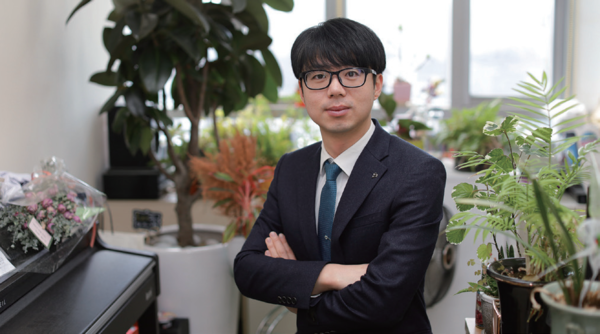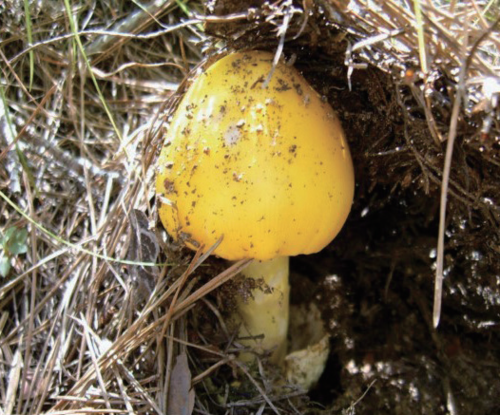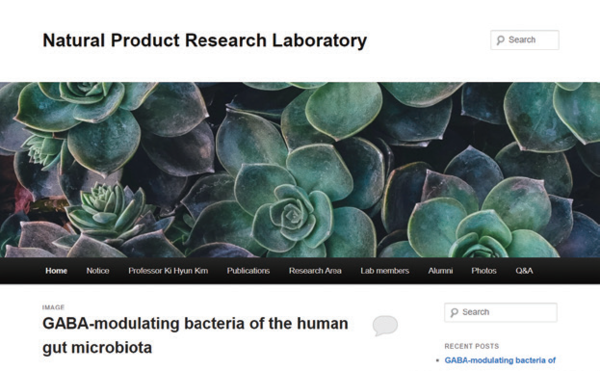According to the 2019 Cancer Statistics published by the Ministry of Health and Welfare last year, the probability of being diagnosed with cancer within one’s lifetime is about 38% in Korea. Cancer has been the number one cause of death for the last 40 years. For World Health Day on April 7th, the Sungkyun Times (SKT) interviewed Kim Ki-hyun, a Professor from the School of Pharmacy, who has conducted research in anti-cancer substances derived from poisonous mushrooms.
School of Pharmacy Professor, Kim Ki-hyun
Q1. Please introduce yourself
I am Kim Ki-hyun, a professor from the School of Pharmacy at Sungkyunkwan University (SKKU). I started to study at SKKU in 2001 and completed a Master of Science and a Doctor of Philosophy. After that, I took the Postdoctoral Research Fellowship program at Harvard University and came back to SKKU in March 2014 as a professor. Last year, I stayed at Harvard Medical School for research and returned to SKKU in March of 2022.

Q2. What was the main reason for you gaining an interest in science?
Thinking about it now, I had wanted to be a scientist since my childhood. When I was in elementary school, I wrote down that my dream was to become a scientist. I was also interested in inventing when I was young, and I liked math and science during my school days.
Q3. You have majored in natural substances among the several subfields in the School of Pharmacy. What made you choose this field exactly?
You may think I am strange, but I like choosing a different path from other people. The School of Pharmacy is a unique major compared to other areas in natural sciences, and out of those fields, a major in natural substances is one of the less common ones. Besides, studying natural substances fits me very well. I felt uncomfortable with animal experiments, so I wanted to study in the science field that did not require clinical tests. At that time, I was also interested in plants and medicinal herbs, which led me to major in this field of studies.
A Scientist Turning Poison into Medicine
Q4. For more than eight years, you have researched anti-cancer substances from poisonous mushrooms. Why have you focused on poisonous mushrooms for such a long time?
Very few people study fungi globally. Among them, most tend to focus on edible mushrooms, but more than half of the fungi known to us are poisonous. Therefore, there is a lot to be researched regarding poisonous mushrooms. When I was a graduate student, I was given an assignment on poisonous mushrooms, and I really enjoyed it. Since then, I kept digging into that area, and people began to remember me as someone who studies poisonous mushrooms.
Q5. There are various research topics related to poisonous mushrooms; how did you decide what you wanted to specialize in?
Anti-cancer substances and repressors take up a large part of my research, and there is a reason for this. Plants cannot move anywhere, so they create a substance to protect themselves. The physiological substances plants create sometimes have medicinal properties for humans, so we make medicine using those substances. A particular feature of mushrooms is that they evolve and make new protective substances by eating nutrients from host plants. For this reason, poisonous mushrooms harbor substances strong enough to kill other creatures. By the same logic, we can use them to kill other harmful materials such as cancer. When we use them to kill cancer cells, they become anti-cancer substances, and when used to kill viruses or bacteria, they become antimicrobial substances or antibiotics.
Q6. In February 2022, you discovered Helicobacter pylori causing stomach cancer and stomach ulcers from Amanita hemibapha subspecies javanica. How did the research process go?
Most of the poisonous mushrooms belong to the Amanitaceae family, but Amanita hemibapha subspecies javanica is edible even though it is part of the Amanitaceae family. Helicobacter pylorus is a harmful germ that causes stomach cancer and stomach ulcers, but it does not die easily even through strong stomach acid. For this reason, I decided to research substances to kill Helicobacter pylori, and the substance discovered this time could kill the germ effectively. It was discovered during the research process accidentally, rather than intentionally. This was also famously the case with penicillin, the first antibiotic discovered by the Scottish microbiologist Alexander Fleming. Most great discoveries happen by pure chance.

Q7. You have been steadily publishing your research since 2014. What makes you study so persistently?
I believe it is because I find it to be fun; my research area suits me well. Everything in nature can be the source of new research. Even while watching television, I come up with new ideas by thinking, “Oh, I wonder what that is. I want to know.” As some health food products are trendy overseas, I started to study them, wondering if they have that effect. Recently, many women say that they have skin trouble because of masks. So, I am studying functional materials by mixing substances that are good for the skin and that also inhibit the coronavirus disease 2019 (COVID-19)
Q8. You were selected as a “2020 SKKU Young-Fellowship Professor,” which is given to the best professor based on the quality of research papers. What do you think is your best research so far?
I find it rather difficult to select a single research paper as my best achievement. I tend to have an attachment to projects that were difficult to conduct or papers that had important results even though they were published in unknown science journals. For example, there is a plant named Verticillate Paris, which is used as a medicinal herb. People use the plant as a treatment for asthma. Having conducted research in poisonous plants, however, I discovered that the root of Verticillate Paris had toxic components that cause liver cancer. No one had reported this fact yet, so I published a paper so that people could be careful when consuming the plant.
Q9. What were the main difficulties you experienced during your research, and how did you overcome them?
I am the kind of person that likes to dig deeply into a single topic, so once I understand it, I feel good. Research is always difficult, so when I cannot solve something even when I try my best, I ask for help from other experts. I am not ashamed of asking for help from those who know better than I do. I always learn something new, and I try again after learning what it is that I do not know. Life seems more difficult than research is. In research, more effort begets better rewards. Many times, the results are not what we were expecting, but that is the reason why we do research in the first place. Whenever I encounter difficulties, I think, “this is exactly why I started this.”

Kim Ki-hyun in 2022
Q10. Please introduce any projects you have for 2022.
From July 2021, I became an International Inspection Committee member of the International Organization World Green Climate Association (IO-WGCA), so I should care more about preserving the environment. Recently, climate change has become a more pressing issue, so I have been conducting research on medicine that can help save the Earth. Of course, developing a new type of drug for human beings is my dream. However, I felt that drug development is very difficult, so I have been focusing on cosmetics and health food products lately.
Q11. Do you have any other goals for 2022?
I want to exercise more. I turned 40 years old this year, and my physical strength has declined a lot; I have been thinking about going to the gym lately. I have also been feeling like my eyesight is getting worse, although we cannot prevent presbyopia with medication.
Q12. Any advice for Kingos?
I often say that students should “target a niche market.” Instead of focusing on popular and competitive markets, finding your niche can be more rewarding for the same effort. I hope students can find their niche. Of course, it would be nice to succeed in a popular area, but I usually say that it is much easier if you go to places with untapped potential.
